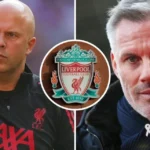UEFA make decision on Federico Chiesa Champions League inclusion

It has been a whirlwind of emotions for Liverpool fans in the last few days, and once again, the focus is on UEFA’s new Champions League rule and how it has completely changed the fate of Federico Chiesa at Anfield. A story that started with disappointment and heartbreak has now transformed into hope and excitement, and it all comes down to timing, injuries, and the unpredictable nature of football.
When Liverpool announced their 22-man Champions League squad earlier in September, there was one name missing that shocked everyone. Federico Chiesa, the Italian winger signed with high expectations, was not included. Despite his strong performances at the start of the season, despite showing flashes of the electric pace and creativity that made him a star in Serie A, Chiesa was left out. Arne Slot and the Liverpool staff had chosen to prioritize other names because of the strict UEFA rule: only 17 non-homegrown players could be registered, and Chiesa simply did not make the cut.
For the player, it was painful. At 27 years old, Chiesa is in the peak years of his career. He left Juventus and Italy with a dream of conquering the Champions League in a Liverpool shirt. To hear that he would not even be part of the squad for the group stage was a devastating blow. For fans too, the decision felt strange. Many asked on social media why a player of his quality could be sidelined when his energy, his dribbling, and his direct attacking style could make a difference on European nights.
But football has a way of twisting stories. Just when it looked like Chiesa’s Champions League dream was slipping away, UEFA announced a rule change that gave him and Liverpool a lifeline.
The governing body confirmed a new adjustment: if a player suffers a long-term injury and is ruled out for the rest of the season, clubs can now replace him in the Champions League squad. This was not the case before. In the past, the squad list was locked after the deadline, with no changes allowed until after the group stage. Managers had no flexibility, and injured players often left big gaps that weakened squads. But UEFA admitted that in today’s game, with its heavy schedule and relentless intensity, such rigidity no longer made sense.
The change came at the exact moment Liverpool needed it. In their Carabao Cup win against Southampton, young defender Giovanni Leoni suffered a devastating anterior cruciate ligament injury. At only 18, the Italian prospect had impressed coaches and fans with his calmness on the ball and defensive maturity. But disaster struck, and Arne Slot confirmed that Leoni would be out for around a year. It was heartbreaking news. A bright career suddenly paused, a promising talent forced to watch from the sidelines as his teammates continue the journey.
For Liverpool, the blow was not only emotional but also practical. It left them with one less defender and forced them to rethink their squad depth for Europe. Under normal rules, nothing could be done. But with UEFA’s update, the door opened for a change. And Liverpool acted quickly.
The club submitted a request to UEFA to replace Leoni with Chiesa in the Champions League “List A”. Days later, the approval came. Chiesa, once excluded, is now officially part of Liverpool’s Champions League squad and will be available for their crucial trip to Galatasaray next week. The statement from the club was clear and emotional
“Federico Chiesa has been added to Liverpool’s Champions League squad. UEFA have approved a request to add the Italian to the Reds’ ‘List A’, in line with a new regulation allowing a change in the event of a long-term absence. Chiesa replaces Giovanni Leoni in the club’s pool of eligible players for the league phase and will be available for the trip to Galatasaray next week.” For Chiesa, it is redemption. For Liverpool, it is reinforcement. For fans, it is relief.
The timing could not have been more dramatic. Liverpool’s Champions League campaign is about to get more intense, and they need depth and creativity. Chiesa, with his ability to cut inside, take on defenders, and deliver key goals, could be the difference-maker. His energy on the wing, his passion to prove himself, and his hunger after being initially left out could light up Anfield’s European nights
But there is also another side to this story—the pain of Giovanni Leoni. Arne Slot was visibly emotional when confirming the injury. The young defender had just broken into the squad, showing he had the tools to become a long-term star. Now, he faces surgery, months of rehabilitation, and the mental battle of watching from the sidelines. Slot admitted: “It is very hard to take the positives. Giovanni will be out for around a year. He is young, and this is a big challenge, but he has the right mentality to come back stronger.”
The Liverpool dressing room has rallied around Leoni. Senior players like Virgil van Dijk and Andy Robertson have already spoken about supporting him. They know how lonely recovery can be, and they also know that football careers can be shaped by how players handle such setbacks. For Leoni, the journey will be tough, but the support is there.
Meanwhile, Chiesa’s inclusion is already being celebrated by fans. Many believe that this twist of fate could unlock his best form. After all, he now has the chance to play in the competition he dreamed of, against some of Europe’s biggest clubs. Galatasaray away will be his first test, and the Turkish atmosphere is famously hostile. But Chiesa thrives in big moments. His performances for Italy at Euro 2020 showed his fearless character, and Liverpool supporters are eager to see that fire in their colors on European nights.
This situation also highlights the importance of UEFA’s new rule. Injuries are part of football, but they should not permanently punish squads. By allowing replacements, UEFA has made the competition fairer and more adaptable. Liverpool are not the only team to benefit—many clubs will welcome this flexibility as they navigate packed schedules.
Still, the debate continues. Some critics argue that this change gives bigger clubs with deeper squads an even greater advantage. Smaller clubs with limited options may struggle to find replacements of similar quality, while giants like Liverpool can bring in stars like Chiesa. Others, however, see it as common sense—a way to ensure the best players are on the pitch and the competition remains exciting.
For now, Liverpool do not care about the politics. For them, this is about survival, adaptation, and ambition. Losing Leoni is heartbreaking, but gaining Chiesa for Europe is a silver lining. Arne Slot now has another weapon in his arsenal, one that could prove vital as the season unfolds.
Fans are already dreaming of scenarios. Imagine Chiesa running down the wing at Anfield under the lights, scoring a decisive goal in the group stage. Imagine him linking with Mohamed Salah, Alexis Mac Allister, and Dominik Szoboszlai to create one of the most fluid midfields and attacks in Europe. This is the hope that football thrives on—the belief that every setback can be turned into an opportunity.
And so, as Liverpool prepare for their trip to Galatasaray, the mood has shifted. From despair over injuries to excitement over new possibilities, the story of Chiesa’s Champions League inclusion is a reminder of football’s unpredictability. One door closed with Leoni’s injury, but another opened for Chiesa.
It is a twist that fans will not forget quickly. It is a reminder that rules, timing, and fate can all combine to change the narrative in a single week. For Chiesa, it is a chance to prove why he belongs at Liverpool. For Leoni, it is the start of a painful but hopefully inspiring comeback story. For the club, it is another chapter in their long history of drama, resilience, and European passion.















